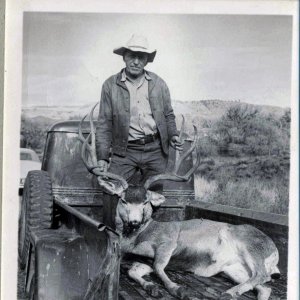202typical
Long Time Member
- Messages
- 3,123
This is why I think McCain will beat Obama.
Turning Obama Into Jimmy Carter
by Steve Kornacki | February 25, 2008
Late in the summer of 1976, President Gerald Ford and his inner circle huddled in Vail, Colorado, facing the grimmest general election outlook for a Republican since the L.B.J. landslide of ?64.
An unelected president, Ford had barely secured the Republican nomination against a fierce challenge from Ronald Reagan, leaving the party?s conservative base dispirited and even more distrustful of Ford than they already had been. And the stench of Watergate?and Ford?s politically damaging pardon of Richard Nixon?stubbornly hung in the air. After eight years of Republican rule, an amorphous but potent yearning for change had taken hold.
At the Vail strategy session, the Ford team zeroed in on the chief vulnerabilities of their Democratic opponent, Jimmy Carter: His lack of experience, his lack of accomplishments and his lack of specificity on the issues. These had to be exploited mercilessly.
And they were. Ten weeks later, Ford came within an eyelash of a political miracle. After trailing by 33 points around Labor Day, he was edged out by a handful of electoral votes?and just two points in the popular vote. If the campaign had lasted even a week longer, many believe, Ford would have won.
Thirty-two years later, the G.O.P.?s chances of retaining the White House for a third straight term may hinge on recycling that old Ford recipe.
Once again, the fall landscape looks miserable for them. In John McCain, they are poised to nominate a candidate who does just as little for the base as Ford did. And twice as many voters?many of them independents, and more than a few registered Republicans?have participated in this year?s Democratic primaries than in the G.O.P. contests. After eight years of George W. Bush and five years of war in Iraq, change is once again in vogue.
And once again, the Democrats seem ready to nominate a candidate whose appeal is rooted more in the emotions that he stirs than in the details of his 12-point plans. For Jimmy Carter in 1976, the operative word was trust. For Barack Obama in 2008, it is hope.
Actually, the similarities between Carter and Obama are considerable. Like Obama, Carter?s resume included service in a state Legislature (rare for a president), and only a very brief stint in high-profile office, his single term as Georgia?s governor from 1970 to 1974. Obama, of course, has only been in the U.S. Senate since 2005, after an eight-year run in the Illinois state Senate.
Both also outsmarted their intra-party foes when it came to primary strategy. In ?76, Carter was the lone Democrat to comprehend the opportunities that attended the proliferation of state primaries and caucuses, entering the race early and targeting every state, a tactic that produced weekly victories, hordes of delegates, and a gathering sense of momentum that left his late-starting rivals in the dust. Similarly, the wisdom of Obama?s decision to contest small caucus states and all of the mid-size contests between Super Tuesday and March 4 - and the lack of wisdom in Hillary Clinton?s decision not to do so?is only now becoming clear.
Most significantly, both men came along at exactly the right time. Carter?s peanut-farmer-from-Plains simplicity and his oft-repeated promise that he ?will never lie to you? were powerful political weapons after Nixon and his wiretapping, his plumbers and his pardon from Ford. And Obama?s message of hope?and his own life story?resonates with an electorate that, after these past eight years, feels utterly disconnected from its government and simply wants to believe in someone again.
In the ?76 primaries, Carter?s Democratic foes at first ignored his trust theme and then?when it was too late?brayed against it, warning that he'd been maddeningly vague about what he'd actually do as president. Hillary Clinton?s warnings about Obama, it appears, have been just as tardy and futile.
But the ?76 example tells us that criticisms that don't stick during the primary season can still work in the general election. Day after day in fall campaign, the Ford forces pounded away at the experience question and painted Carter as a political illusion, an affable-seeming politician who was terrified of expressing his opinion on any controversial topic.
?It is not enough to say, ?Trust me,?? Ford said at one rally. ?Trust must be earned. Trust is not having to guess what a candidate means. Trust is leveling with people before the election about what you're going to do after the election. Trust is not being all things to all people, but being the same thing to all people.?
The media eventually caught on too, scrutinizing Carter with a daily intensity that was absent in the primary season, and Carter?s lead steadily eroded.
McCain is readying the same kind of attack against Obama.
?I'm not the youngest candidate,? he said last week. ?But I'm the most experienced.? And at a different event, he charged that Obama is offering ?an eloquent but empty call for change.?
Obama may prove a more durable fall candidate that Carter. He?s been more specific in his proposals than Carter was (see: health care and diplomacy with hostile nations), and his personal bond with the electorate may prove deeper and more intense than Carter?s ever was.
But if you're tempted to think Obama has too much working in his favor to lose in November, just remember what very nearly happened in 1976.
"Thanks climate PhD 202" - TFinalshot Feb-05-08, 02:16 PM (MST)
Turning Obama Into Jimmy Carter
by Steve Kornacki | February 25, 2008
Late in the summer of 1976, President Gerald Ford and his inner circle huddled in Vail, Colorado, facing the grimmest general election outlook for a Republican since the L.B.J. landslide of ?64.
An unelected president, Ford had barely secured the Republican nomination against a fierce challenge from Ronald Reagan, leaving the party?s conservative base dispirited and even more distrustful of Ford than they already had been. And the stench of Watergate?and Ford?s politically damaging pardon of Richard Nixon?stubbornly hung in the air. After eight years of Republican rule, an amorphous but potent yearning for change had taken hold.
At the Vail strategy session, the Ford team zeroed in on the chief vulnerabilities of their Democratic opponent, Jimmy Carter: His lack of experience, his lack of accomplishments and his lack of specificity on the issues. These had to be exploited mercilessly.
And they were. Ten weeks later, Ford came within an eyelash of a political miracle. After trailing by 33 points around Labor Day, he was edged out by a handful of electoral votes?and just two points in the popular vote. If the campaign had lasted even a week longer, many believe, Ford would have won.
Thirty-two years later, the G.O.P.?s chances of retaining the White House for a third straight term may hinge on recycling that old Ford recipe.
Once again, the fall landscape looks miserable for them. In John McCain, they are poised to nominate a candidate who does just as little for the base as Ford did. And twice as many voters?many of them independents, and more than a few registered Republicans?have participated in this year?s Democratic primaries than in the G.O.P. contests. After eight years of George W. Bush and five years of war in Iraq, change is once again in vogue.
And once again, the Democrats seem ready to nominate a candidate whose appeal is rooted more in the emotions that he stirs than in the details of his 12-point plans. For Jimmy Carter in 1976, the operative word was trust. For Barack Obama in 2008, it is hope.
Actually, the similarities between Carter and Obama are considerable. Like Obama, Carter?s resume included service in a state Legislature (rare for a president), and only a very brief stint in high-profile office, his single term as Georgia?s governor from 1970 to 1974. Obama, of course, has only been in the U.S. Senate since 2005, after an eight-year run in the Illinois state Senate.
Both also outsmarted their intra-party foes when it came to primary strategy. In ?76, Carter was the lone Democrat to comprehend the opportunities that attended the proliferation of state primaries and caucuses, entering the race early and targeting every state, a tactic that produced weekly victories, hordes of delegates, and a gathering sense of momentum that left his late-starting rivals in the dust. Similarly, the wisdom of Obama?s decision to contest small caucus states and all of the mid-size contests between Super Tuesday and March 4 - and the lack of wisdom in Hillary Clinton?s decision not to do so?is only now becoming clear.
Most significantly, both men came along at exactly the right time. Carter?s peanut-farmer-from-Plains simplicity and his oft-repeated promise that he ?will never lie to you? were powerful political weapons after Nixon and his wiretapping, his plumbers and his pardon from Ford. And Obama?s message of hope?and his own life story?resonates with an electorate that, after these past eight years, feels utterly disconnected from its government and simply wants to believe in someone again.
In the ?76 primaries, Carter?s Democratic foes at first ignored his trust theme and then?when it was too late?brayed against it, warning that he'd been maddeningly vague about what he'd actually do as president. Hillary Clinton?s warnings about Obama, it appears, have been just as tardy and futile.
But the ?76 example tells us that criticisms that don't stick during the primary season can still work in the general election. Day after day in fall campaign, the Ford forces pounded away at the experience question and painted Carter as a political illusion, an affable-seeming politician who was terrified of expressing his opinion on any controversial topic.
?It is not enough to say, ?Trust me,?? Ford said at one rally. ?Trust must be earned. Trust is not having to guess what a candidate means. Trust is leveling with people before the election about what you're going to do after the election. Trust is not being all things to all people, but being the same thing to all people.?
The media eventually caught on too, scrutinizing Carter with a daily intensity that was absent in the primary season, and Carter?s lead steadily eroded.
McCain is readying the same kind of attack against Obama.
?I'm not the youngest candidate,? he said last week. ?But I'm the most experienced.? And at a different event, he charged that Obama is offering ?an eloquent but empty call for change.?
Obama may prove a more durable fall candidate that Carter. He?s been more specific in his proposals than Carter was (see: health care and diplomacy with hostile nations), and his personal bond with the electorate may prove deeper and more intense than Carter?s ever was.
But if you're tempted to think Obama has too much working in his favor to lose in November, just remember what very nearly happened in 1976.
"Thanks climate PhD 202" - TFinalshot Feb-05-08, 02:16 PM (MST)












